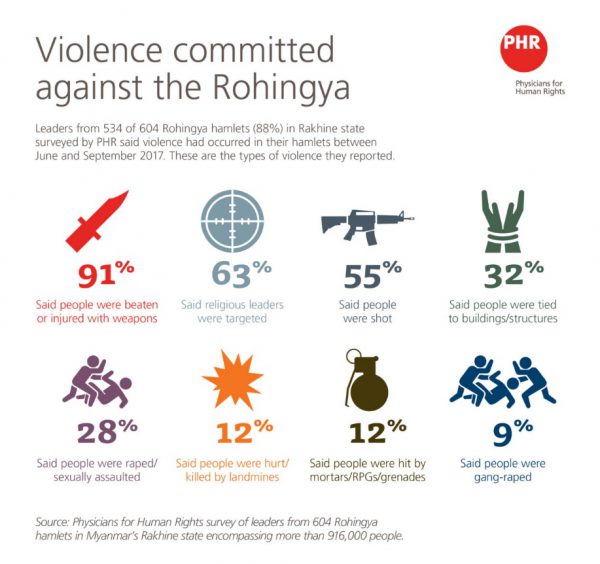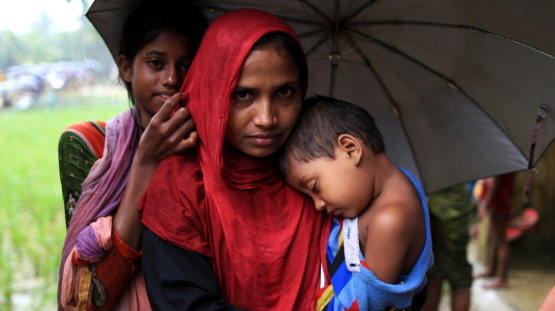By: Carolina Battistella & Jade Tyson
Background of the Issue
The Muslim Rohingya people of Myanmar have endured various human rights atrocities and violations of international humanitarian law for years resulting in systematic oppression and the ‘othering’ of the community. This began as early as the 1970s with discriminatory practices such as restrictions on their travel, marriage, and access to birth certificates. They were similarly subjected to arbitrary arrests and forced labor. These discriminatory acts, along with increased acts of violence, escalated against the Rohingya people in 2012, eventually leading to nearly 1 million Rohingya people fleeing to Bangladesh for safety.

“Rohingya refugees walk through a shallow canal after crossing the Naf River as they flee violence in Myanmar to reach Bangladesh in this photo taken in October of last year.” (AFP photo)
In March 2017, the UN Human Rights Council established a Fact-Finding Mission in Myanmar to uncover the facts surrounding the alleged human rights atrocities. The mission conducted over 875 interviews with victims and witnesses, obtained satellite imagery, and authenticated various documents, photos, and videos as part of the investigation.
The OHCHR’s Report of the Independent Fact-Finding Mission on Myanmar highlights such heinous acts, including murder, sexual violence, enslavement, torture, and forced deportation, which have been largely committed and incited by military forces in Myanmar (Tatmadaw), anti-Rohingya groups (ARSA), and police forces. The Mission recommended certain “senior generals of the Myanmar military should be investigated and prosecuted in an international criminal tribunal for genocide, crimes against humanity and war crimes.”
These tactics, as well as targeted “clearance operations” aimed at instilling fear in and violence against the Rohingya people through arsons, mass killings, grievous gang rapes, and torture have led nearly 1 million Rohingya people to flee Myanmar for Bangladesh as of September 2018.

Many Rohingya flee without access to food, water, or shelter. Once displaced to camps, they suffer continued hardships including lack of freedom of movement, access to sufficient food supply, education for their children, health care, and overall livelihood. The Rohingya people have not only been driven from their places of origin, but their homes have since been destroyed and converted into security forces and housing for other ethnic groups. This has obstructed the opportunity of returning and re-establishing themselves in Myanmar.
The U.N. Security Council sent diplomats to visit the Bangladeshi camps in May 2018 and pledged to “take action” regarding the issue. The Council issued a Presidential Statement in November 2018 condemning the actions against the Rohingya people and urging the government of Myanmar “to ensure no further excessive use of military force…to restore civilian administration and apply the rule of law, and to take immediate steps in accordance with their obligations and commitments to respect human rights.”
Further action from the Security Council has been halted, however, and will likely remain halted due to objections from Russia and China – permanent members of the Council – in referring the issue to the International Criminal Court (“The Court”). The two countries also voted also against a draft U.N. General Assembly Resolution at the end of October which called on Myanmar to end military force against the Rohingya people and open an independent investigation to ensure “perpetrators are held accountable.”
However, at the end of September, a decision by the U.N. Human Rights Council established a new independent international fact-finding mission in Myanmar.
For more on this new mechanism and for what comes next for this case, see Part 3: Justice for the Rohingya: Issues and Possible Solutions.
Pre-Trial Chamber Decision
On April 9, 2018, in response to receiving a total of 34 communications on this situation pursuant to Article 15, ICC Chief Prosecutor Fatou Bensouda filed a request under 19(3) of the Rome Statute asking for a determination of the Court’s jurisdiction, pursuant to Article 12(2)(a) of the Statute, over the alleged deportation of members of the Rohingya people from Myanmar, which is not a State Party to the Rome Statute, to Bangladesh, which is. This was the first time the Prosecutor has submitted a request pursuant to Article 19(3) which empowers the Prosecutor to request a ruling from the Court on a question of jurisdiction or admissibility. The Prosecutor argued, in consonance with Article 19(3), she has the power to seek a ruling on a question of jurisdiction or admissibility at any stage of the proceedings.

(Peter Dejong/AP)
On September 6, 2018, Pre-Trial Chamber I (the “Chamber”) of the Court, composed of Judge Marc Perrin de Brichambaut, Judge Reine Adélaïde Sophie Alapini-Gansou, and presided by Judge Péter Kovàcs, rendered its decision on the matter. All three judges signed the majority opinion, with Judge Marc Perrin de Brichambaut appending a partial dissenting opinion.
For more on this Parial Dissent, see Part 2: Did the ICC Get it Right? A Look at the Decision to Establish ICC Jurisdiction in Myanmar.
In accordance with Article 119(1) and Article 21(1)(b), the Chamber is enabled to rule on the question of jurisdiction given the principle of Kompetenz-Kompetenz, conferring to a court the competence as to the extent of its own jurisdiction on an issue before it.
The objective international legal personality of the Court does not imply erga omnes jurisdiction. Nevertheless, the Chamber noted in paragraph 43 of its opinion because of the Court’s relationship with United Nations and consistent with principles of international law, in certain situations, the Statute may have an effect on States not Party to the Statute. Accordingly, the Chamber assessed its jurisdiction in relation to the matter sub judice.
“[…] If this country is not a UN Member State, which is a theoretical hypothesis nowadays, the competences of the Security Council pursuant to Chapter VII of the UN Charter suffice to force the cooperation of the State in case of a threat to the peace. In such a situation, the objective legal personality of the UN assists the ICC to act accordingly.”
The Chamber’s majority opinion held the Court may exercise its territorial jurisdiction over the Rohingya’s deportation, even though the coercive acts underlying the alleged violations occurred in a non-State party. First, the Chamber decided that Article 7(1)(d) contains two separate crimes, i.e. forcible transfer (destination to another location) and deportation (destination to another State).
“[…] the Chamber further considers that the requirement of displacement across a border constitutes a specific element of the crime of deportation under article 7(1)(d) of the Statute.”
In finding jurisdiction, the Chamber then relied on the fact an element of the crime of deportation, namely the crossing of a border, was committed in State-party Bangladesh. The Chamber noted that under article 12(2)(a) of the Statute:
“the Court may exercise its jurisdiction if one or more of the following States are Parties to this Statute or have accepted the jurisdiction of the Court in accordance with paragraph 3: (a) [t]he State on the territory of which the conduct in question occurred […].”
Furthermore, the Chamber found “that the rationale of its determination as to the Court’s jurisdiction in relation to the crime of deportation may apply to other crimes within the jurisdiction of the Court as well” (para. 74). Thus, the Chamber ordered the Office of the Prosecutor to investigate other crimes against humanity over which the Court may exercise jurisdiction, namely the crimes of persecution and “other inhumane acts.”

(c) Al Jeezera
The Prosecutor may now proceed with her Preliminary Examination on the alleged crimes committed against the Rohingya. The Chamber notes that such an investigation should “be initiated without delay and be conducted efficiently in order for it to be effective” (para. 86).
To read more on how national systems find jurisdiction for transnational crimes, read Part 4: Claiming Jurisdiction: Comparing the ICC Pre-Trial Chamber Decision Regarding Myanmar with Other Approaches.
This series was created and edited under the direction of Harris Institute Fellow Madaline George.
